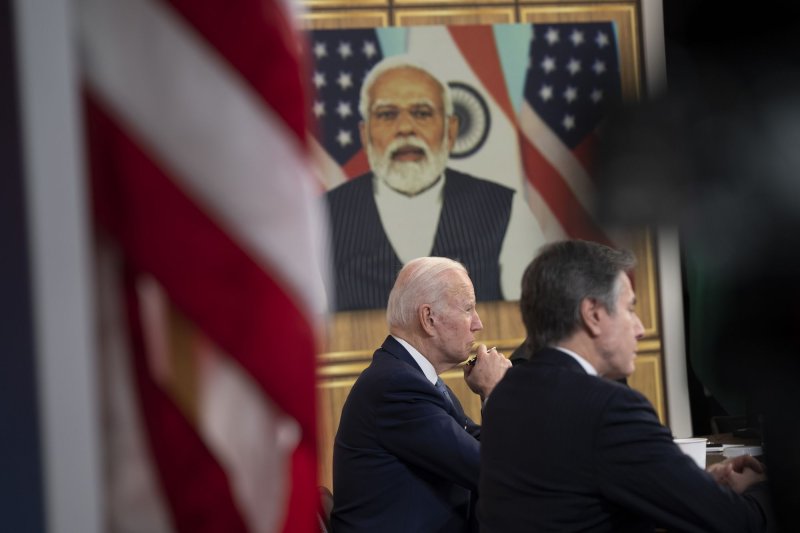The U.S. Commission on International Religious Freedom on Monday called on the State Department to designate India as a Country of Particular Concern over its violations of religious freedom. File Photo by Chris Kleponis/UPI |
License Photo
May 1 (UPI) -- For the fourth consecutive year, an independent U.S. government panel has called on the United States to add India to its list of countries guilty of committing severe violations of religious freedom.
The U.S. Commission on International Religious Freedom renewed its call for blacklisting New Dehli on Monday with the release of its annual report documenting developments in religious freedom over the past year.
Since 2020, the independent, bipartisan commission has been calling for the State Department to label India a Country of Particular Concern, which is under the International Religious Freedom Act, following the Hindu nationalist government of Prime Minister Narendra Modi's enactment of the controversial Citizenship (Amendment) Act that provides a pathway to citizenship for non-Muslim migrants.
The USCIRF report on Monday said religious freedom in India has "continued to worsen" as governments at the national, state and local levels last year "promoted and enforced religiously discriminatory policies, including laws targeting religious conversion, interfaith relationships, the wearing of hijabs and cow slaughter."
"The continued enforcement of discriminatory laws facilitated a culture of impunity for widespread campaigns of threats and violence by mobs and vigilante groups," it said.
The document adds that the country, which has a nearly 80% Hindu majority population, is secular by its constitution but that since Modi took power in 2014 the government "has facilitated and supported national and state-level policies that undermine religious freedom for minority groups."
The report notes that the United States and India maintain strong bilateral ties, suggesting this is why India has yet to be included on the list.
After the Biden administration failed to label India a CPC, the USCIRF issued a statement of outrage, accusing the Biden administration of "turning a blind eye" to severe religious freedom violations.
On Monday, the Indian American Muslim Council welcomed the recommendation while urging the State Department to adopt it.
"This decision reaffirms what IAMC has been saying for years: that India's government, under Prime Minister Narendra Modi, has continued to systematically violate the religious freedom of minority communities, particularly Muslims and Christians," Rasheed Ahmed, IAMC executive director, said in a statement.
"It is high time that the State Department acts on USCIRF's recommendation and holds India accountable as the ground situation becomes increasingly more violent and dangerous for its religious minorities."
Monday's report recommended a total of 17 of countries for CPC labeling, including India and four other nations that were not previously blacklisted.
Among them are Nigeria, Afghanistan and Syria, which the Biden administration also failed to designate despite being recommended to do so in last year's report. The fifth country newly recommended for blacklisting was Vietnam.
The countries recommended for re-designation as CPC are Myanmar, China, Cuba Eritrea, Iran, Nicaragua, North Korea, Pakistan, Russia, Saudi Arabia, Tajikistan and Turkmenistan.
The report also called on the State Department to place 11 countries on its Special Watch List, including Algeria and Central African Republic, which were on the list last year.
It also requests for the first time that Sri Lanka be added to the list over "its deteriorating religious freedom conditions in 2022."
The other countries recommended for the SWL are Azerbaijan, Egypt, Indonesia, Iraq, Kazakhstan, Malaysia, Turkey and Uzbekistan.
The report also highlighted the deteriorating conditions in Iran as the Middle Eastern regime confronts a women-led anti-regime protest that erupted in September following the police-involved death of a young woman who was arrested on allegations of violating the country's strict hijab laws.
The commission said it chose its cover image to be of an Iranian woman to honor "the women and girls who have been at the forefront of the ongoing protests for greater freedom in Iran and have faced extreme and violent consequences for their participation."















